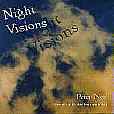Peter Neri: My brother was in the Air Force and brought home an acoustic guitar--it was a Harmony round top--when I was 14 years old. I was immediately drawn to it and started picking out tunes from records. I listened to the Ventures a lot in those days. Musical taste is an evolutionary process, though. I listened to and played a lot of different kinds of guitar music, and that ultimately molded my style into the somewhat eclectic brand that it is now.
Peter Neri: I recorded "Night Visions" using a Gibson J-45 acoustic (circa 1962) for all but two of the numbers. That guitar has traveled with me for many years and I am still finding ways to cajole different sounding music out of it. It is a hearty beast and has survived a lot of torture that I have put it through. I also play an Alvarez-Yairi classical guitar - a really sweet sounding nylon-stringed gem. When I play out I bring along a Peavey Ecoustic which has plenty of punch and lends itself well to some of my more
upbeat and percussive numbers.
Peter Neri: I don't think that there ever is a definite end point that one should be aspiring to. When I first started to record "Night Visions", the engineer thought that I had listened to a lot of Michael Hedges. In fact, at the time, I had not even heard of him. I don't listen to scads of music these days like I used to. I want my music to go in unique and melodic directions.
Peter Neri: "Night Visions" is my debut album. I continue to write, as it is a part of my life. I have enough new material for another album but no immediate plans to take on another recording project. I intend to make enough money back on the first album to justify a second.
Peter Neri: I usually get my ideas late at night in my kitchen while fingering around on the trusty Gibson. With a family and a full time day job, that is the only time I get to myself. Something happens in the quiet of the night, when you are kind of in an alpha-brain wave state and your defenses are down and you are opening channels for the unknown to penetrate your being. It is similar to a meditative state, when images or scenes fly by while you are quietly watching from a removed place. I get tons of musical ideas when I'm playing like that. Unfortunately, it doesn't happen every night,
and I also forget a lot when I try to find where I was the next day. I
employ a small cassette recorder at times to help with that, although the act of pushing the buttons, getting levels, etc., gets me out of that
special place.
Peter Neri: I rent time at a small recording studio here in Vermont. The technical complexities of recording, mixing, etc.--even a solo instrument--is not something that I choose to master at this time.

Peter Neri: The scenario is different for everyone and where they find themselves with their lives and their music. I was at a point where I did not expect to tour nationally, or make millions of dollars with my music, so my decision to release my own product just made sense. I've been to the bigger labels with much more commercial sounding music than what I am playing now, and I
never got anywhere. I also needed to have the flexibility to price and sell my album when and where I wanted. And finally, I wanted to see all the profits from record sales come to me--the guy who paid the recording, graphics and replication costs.
Peter Neri: The advantages are that you get to call all the shots, you get all the rewards for your own work, and you have artistic and creative freedom.
The disadvantages are that it takes a hell of a lot of energy, time and
money to take on a project like releasing a CD. Also, some of the areas you are diving into may not be ones that you are particularly talented in. A good guitarist may not be the best marketer in the world. Of course, having a label with contacts and a certain mechanism that kicks in when they do a release is a huge advantage over first-time independents who learn as they go.
Peter Neri: Plan your project. In the words of Sir John Templeton, "Failing to plan is planning to fail." Write your goals down on paper. Have a 6-month, 1-year, 5-year plan written down, but also know that you can change it as you go. Life isn't cast in stone, and neither should your plan. There are some excellent articles on this web site on planning for the long haul--I don't
need to repeat them here. After you have blown a wad on recording, plan to have money left over to use on promotion. If no one knows that your album exists, no one will buy it. Duh. You don't want to end up with boxes of vanity.
The best marketing tip though, is not to think of the market when you are composing or playing your music. Play only what is true to you--as an independent musician, you have that luxury.